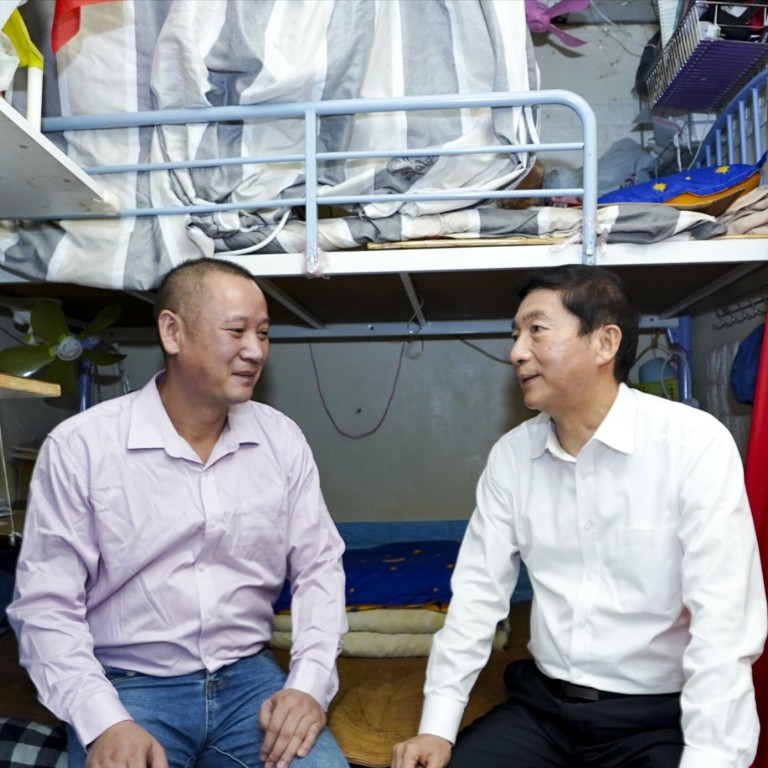
Head of Beijing’s liaison office visits Hong Kong’s needy in rare festival charm offensive
- Luo Huining spends part of National Day meeting unemployed man in Sham Shui Po, woman who donated money to mainland’s Covid-19 battle
- Commentators say visits send message to local officials about doing more to address unemployment and housing problems
Beijing’s top representative in Hong Kong visited underprivileged residents on Thursday in a Mid-Autumn Festival charm offensive that marked the first time in three years the central government’s liaison office has publicised such a community outreach effort.
Luo Huining, who took over as director of the liaison office in January, met an unemployed man at his tiny Sham Shui Po flat and asked his colleagues to help him find a job as soon as possible.
“Only if people have a job, can they have an income … and improve their lives,” Luo was quoted as saying in a press release from the office.
Commentators noted the political significance of the move on National Day, suggesting it showed that Beijing was concerned about unemployment and housing problems in Hong Kong, and was sending a message to local officials about doing more to address such core issues.

The last time the office publicised a similar community relations effort was in August 2017, when then-director Zhang Xiaoming visited Sham Shui Po to meet a restaurateur known for giving away meals to the city’s impoverished and needy. Zhang also visited a family in Yuen Long that same month.
Luo spent 20 minutes chatting with his unemployed host in his Sham Shui Po home measuring less than eight square metres that he once shared with his wife and daughter. Due to their financial difficulties, both had returned to their hometown in China’s Hunan province.
Beijing’s new Hong Kong envoy Luo Huining was a surprise choice. Here’s why
The liaison office noted the Hong Kong government had rolled out a series of relief measures under its Anti-epidemic Fund in a bid to revive the city’s economy, boost employment and alleviate difficulties created by the health crisis.
Before visiting Tsui, Luo first travelled to Siu Sai Wan to visit a 74-year-old woman. She had donated HK$110,000 (US$14,200) to the liaison office at the start of the year, saying she wanted to contribute to anti-pandemic work in Hubei province, the original epicentre of the outbreak.
“He held her hands and said, ‘You are a few years older than me, you are my big sister. Your act shows how Hong Kong and mainland compatriots are deeply connected with each other; it’s touching’,” the office said.
The liaison office added that deputy chiefs Chen Dong and He Jing had also visited families on Hong Kong Island as well as in Kowloon and the New Territories to offer their holiday greetings.
Lau Siu-kai, vice-chairman of the Chinese Association of Hong Kong and Macau Studies, a semi-official think tank based in Beijing, interpreted Luo’s visit as a message that Beijing wanted the local government to do more to help the unemployed and the poor.
Luo Huining stresses to civil servants, youth that loving country ‘not a choice but a duty’
“The first message of Luo’s visit is that Hong Kong must pay more attention to its deep-rooted social conflicts, such as housing and unemployment. It must also strengthen national education to foster a sense of patriotism,” Lau said. “Another message is that in tackling these issues, the central government, the city’s administration and the city’s patriotic camp must work together.”
Pro-establishment lawmaker Michael Luk Chung-hung, of the Federation of Trade Unions, called on local officials to reflect on Luo’s remarks.
“The chief executive and the secretary for labour and welfare need to visit the people too and listen to their voices,” Luk said. “The government has rolled out this Employment Support Scheme, but it really helped the corporations and not the workers. Officials were reluctant to roll out more targeted measures for the jobless, and now even the liaison office is concerned about this.”
Former legislator Lee Cheuk-yan, vice-chairman of the opposition Labour Party, suggested Luo should just tell officials to offer an unemployment allowance, rather than asking his colleagues to find Tsui a job.
He reiterated critics’ concerns about “interference” in local affairs by Beijing’s representatives, saying: “Luo also visited these people as if he’s above the chief executive.”

